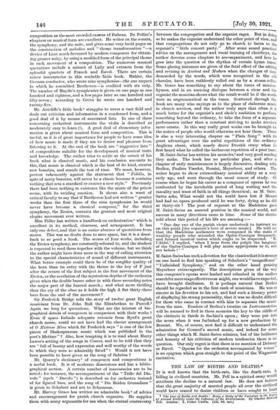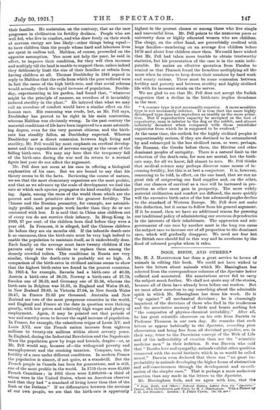tii.b1 LAW OF BIRTHS AND DEATHS.*
IT is well known that the birth-rate, like the death-rate, II falling in civilized countries. Mr. Pell in a spirited essay would attribute the decline to a natural law. He does not believe that the great majority of married people all over the civilized world have ceased to desire children or have sought to limit
• The Law of Births and Deaths : Being a Study of the Variation in the Bcfro of Animal Fertility under the Influence of the Environment. By Charles Edward
Fell. London : T. Fisher Unwin. (12s. Ocl. net.] their families. Ho maintains, on the contrary, that as the race progresses in civilization its fertility declines. People who are well fed, who live in comfort, and who draw freely on their stock of nervous energy are less likely—other things being equal— to have children than the people whose hard and laborious lives are spent in endless toil. Malthus, of course, proceeded on the apposite assumption. You must not help the poor, he said in effect, to improve their condition, for they will then increase and multiply till the land is unable to support them, unless indeed they deliberately limit the size of their families or refrain from having children at all. Thomas Doubleday in 1841 argued in reply to Malthus that the evils from which the poor suffered were in fact the cause of the high birth-rate, and that social reforms would actually check the rapid increase of population. Double- day, experimenting in his garden, had found that, "whatever might be the principle of manure, an overdose of it invariably induced sterility in the plant." He inferred that what we may call an overdose of comfort would have a similar effect on the human race. His reasoning was crude, but, as Mr. Pell says, Doubleday has proved to be right in his main contention, whereas Malthus was obviously wrong. In the past century the material conditions of life have been improved to a most astonish- ing degree, even for the very poorest citizens, and the birth- rate has steadily fallen, as Doubleday expected. Whereas Doubleday saw a direct connexion between high living and sterility, Mr. Pell would lay most emphasis on cerebral develop- ment and the expenditure of nervous energy as the cause of the falling birth-rate. We may say here that the temporary fall of the birth-rate during the war and its return to a normal figure last year do not affect the argument.
Mr. Pell does not seem at his ease in offering a biological explanation of his case. But we are bound to say that his theory seems to fit the facts. Reviewing the course of nature, we see that the most elementary organisms are the most prolific, and that as we advance up the scale of development we find the rate at which each species propagates its kind steadily diminish- ing. Again, among the races of the world those which are the poorest and most primitive show the greatest fertility. The Chinese and the Russian peasantry, for example, are astonish- ingly prolific, and no people work harder than they do or are contented with less. It is said that in China nine children out of every ten do not survive their infancy. In Hong-Kong in 1909, 87 per cent, of the children born died before they were a year old. In Formosa, it is alleged, half the Chinese children die before they are six months old. If the infantile death-rate Is so enormous, then the birth-rate must be very high indeed to enable the population to maintain itself, as it undoubtedly does. Each family on the average must have twenty children if the parents only rear two children to replace them among the densely crowded toilers. The conditions in Russia are very similar, though the death-rate is probably not so high. A comparison of the birth-rates in civilized nations seems to show that the highest birth-rates are found in the poorest countries. In 1901-4, for example, Bavaria had a birth-rate of 40.39, Austria a birth-rate of 38.50, Norway a birth-rate of 37.79, Sweden one of 36.19, and Germany one of 35.34, whereas the birth-rate in Belgium was 31.01, in England and Wales 28.41, in New Zealand 29.63, in Victoria 27.04, in New South Wales 26.47, in France 21.63 per thousand. Australia and New Zealand are two of the most prosperous countries in the world, and England and France at the date in question were thriving greatly, with low prices and relatively high wages and plenty of employment. Again, it may be pointed out that periods of war and scarcity seem to favour the rapid increase of population. In France, for example, the calamitous reigns of Louis XV. and Louis XVL saw the French nation increase from eighteen millions to twenty-six millions within about seventy years. In England, during the Industrial Revolution and the Napoleonic Wars the population grew by leaps and bounds, despite—or, as Mr. Pell would say, because of—the widespread poverty and unemployment and the crushing taxation. Compare, too, the fertility of a race under different conditions. In modern France the population is almost, if not quite, at a standstill. But the French people in Canada has been for generations, and is still, one of the most prolific in the world. In 1759 there were 65,000 French Canadian§ ; in 1901 there were 2,400,000—a third of whom were in the United States, where an American observer said that they had "a standard of living lower than that of the Irish or the Italians." If we differentiate between the sections of our own people, we see that the birth-rate is apparently highest in the poorest classes or among those who live simple and uneventful lives. Mr. Pell points to the numerous peers or university dons or highly educated women who are childless. The clergy, on the other hand, are proverbially credited with large families—numbering on an average five children before 1870 and about four children since then. We could have wished that Mr. Pell had taken more trouble to obtain trustworthy statistics, but his presentation of the case is in the main indis- putable. He makes an effective quotation from Exodus to remind us that Pharaoh found the Israelites multiplying all the more when he strove to keep down their numbers by hard work
and scanty rations. There must be some connexion between fertility and poverty and between sterility and highly civilized life with its incessant strain on the nerves.
We are glad to see that Mr. Pell does not accept the foolish suggestion that a decline in the birth-rate implies decadence in the race.
coarser type is not necessarily superior. A more sensitive type is not necessarily inferior. It is true that the more highly developed type does not reproduce as readily as the more primi- tive. But if reproductive capacity be accepted as the test of superiority, man is inferior to the dog or the rabbit, and almost infinitely decadent when compared with those unicellular organisms from which he is supposed to be evolved."
At the same time, the outlook for the highly civilized peoples is unquestionably serious, if they are destined to be outnumbered by and submerged in the less civilized races, as were, perhaps, the Romans, the Greeks before them, the Hittites and other dominant peoples of antiquity. There is a natural limit to the reduction of the death-rate, for men are mortal, but the birth- rate may, for all we know, fall almost to zero. Mr. Pell thinks
that medical science may perhaps discover some means of in- creasing fertility, but this is at best a conjecture. It is, however,
reassuring to be told, in effect, on the one hand, that we run no great risk of outgrowing our food supplies and, on the other, that our chances of survival as a race will be increased in pro- portion as other races gain in prosperity. The more widely material civilization and comfort are diffused, the more quickly will the excessive birth-rates of the less advanced peoples decline to the standard of Western Europe. Mr. pa does not make this deduction, but it seems to follow from his general argument.
If it be sound, then we have an additional reason for pursuing our traditional policy of administering our overseas dependencies in the interests of their inhabitants. The oppression and mis- government of one race by another must in the long run came the subject race to increase out of all proportion to the dominant race, which will gradually disappear. We need not fear lest the British race should fail in this way and be overborne by the flood of coloured peoples whom it rules.



































 Previous page
Previous page